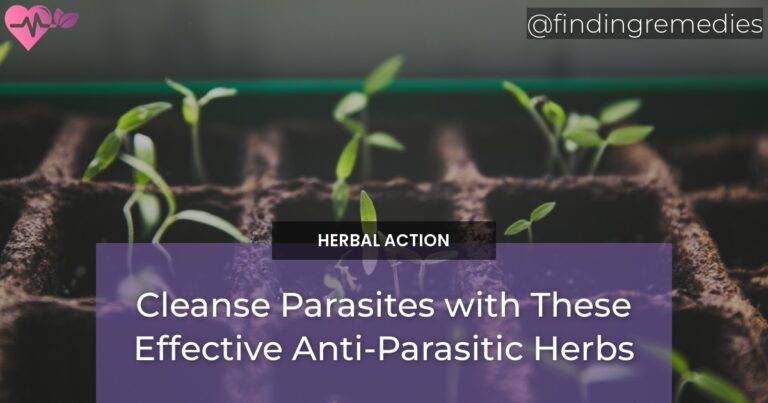Parasites are organisms that live on or inside another organism, known as a host, and derive their nourishment from it. They can cause a range of health problems, from mild discomfort to serious diseases. To combat these parasites, anti-parasitic herbs have been used for centuries.
These anti-parasitic herbs are known for their effectiveness in removing parasites from the body and promoting overall health and well-being.
Table of Contents
Anti-Parasitic Herbs: Definition and Mechanism of Action
Understanding Anti-Parasitic Herbs
Anti-parasitic herbs are natural substances that possess potent properties to combat and eliminate parasites from the body. These herbs have been traditionally used in various cultures across the world for their medicinal benefits. They offer a natural and holistic approach to parasite removal without the side effects associated with conventional medications.
How Anti-Parasitic Herbs Work
The mechanism of action of anti-parasitic herbs involves disrupting the life cycle of parasites, inhibiting their growth and reproduction, and eventually eliminating them from the body. These herbs contain bioactive compounds, such as alkaloids, tannins, and flavonoids, which possess anti-parasitic properties. They target specific parasites and interfere with their metabolic processes, leading to their demise.
Most Potent Anti-Parasitic Herbs for Worms and Protozoa
ALSO READ
Worms: Powerful Anti-Parasitic Herbs
Intestinal worms, such as roundworms, tapeworms, and hookworms, are common parasites that can infect the digestive system. Several herbs have shown potent anti-parasitic effects against these worms. One such herb is black walnut, which contains juglone, a compound that helps expel worms from the body. Cloves are another effective herb known for their anti-parasitic properties, especially against intestinal worms. Wormwood, a bitter herb, is also widely used for its ability to eliminate various types of worms.
Protozoa: Effective Anti-Parasitic Herbs
Protozoa are single-celled parasites that can cause diseases like malaria, giardiasis, and toxoplasmosis. Certain herbs have demonstrated effectiveness against protozoa. Artemisia annua, commonly known as sweet wormwood, contains artemisinin, a compound with potent anti-malarial properties. Grapefruit seed extract is another herb known for its ability to combat protozoan infections. It contains compounds that inhibit the growth and replication of protozoa.
Using Herbs to Remove Parasites from the Body
ALSO READ
Herbal Remedies for Parasite Cleansing
When it comes to parasite cleansing, various herbal remedies can be used. These remedies often combine multiple anti-parasitic herbs to enhance their effectiveness. Some popular herbal combinations include black walnut, cloves, and wormwood, which work synergistically to eliminate parasites from the body. Other herbal remedies may include ingredients like garlic, oregano oil, and berberine, all of which possess potent anti-parasitic properties.
The Role of Anti-Parasitic Herbs in Detoxification
Parasite cleansing is often an integral part of detoxification protocols. Anti-parasitic herbs play a crucial role in these protocols by not only eliminating parasites but also supporting the body’s natural detoxification processes. These herbs stimulate the liver and kidneys to efficiently eliminate waste and toxins from the body, promoting overall wellness.
Proper Safety Guidelines and Dosage for Anti-Parasitics
Safety Precautions when Using Anti-Parasitic Herbs
While anti-parasitic herbs are generally safe to use, it is essential to take certain precautions. Before starting any herbal treatment, it is advisable to consult a healthcare professional, especially if you have underlying health conditions or are taking medications. Pregnant or breastfeeding women should also exercise caution when using these herbs. Additionally, it is important to source high-quality herbs from reputable suppliers to ensure their effectiveness and purity.
Recommended Dosage for Different Anti-Parasitic Herbs
The dosage of anti-parasitic herbs can vary depending on the specific herb and the individual’s age and health status. It is crucial to follow the recommended dosage instructions provided by the manufacturer or healthcare professional. Starting with a lower dosage and gradually increasing it can help minimize any potential side effects. It is also advisable to complete the full course of treatment to ensure the complete removal of parasites.
Other Considerations for Effective Parasite Cleansing
Lifestyle Modifications to Support Parasite Cleansing
In addition to using anti-parasitic herbs, certain lifestyle modifications can support effective parasite cleansing. These include maintaining proper hygiene, such as washing hands before meals and after using the restroom, avoiding consumption of raw or undercooked meat and seafood, and thoroughly washing fruits and vegetables before consumption. Regular exercise, stress management, and a healthy diet rich in fiber and nutrients can also promote a strong immune system and help prevent parasitic infections.
Combining Herbs for Enhanced Anti-Parasitic Effects
For severe parasite infections, combining different anti-parasitic herbs can provide enhanced effects. Certain combinations, such as black walnut, cloves, and wormwood, have been found to be particularly effective against a wide range of parasites. However, it is important to seek professional guidance when combining herbs, as their interaction and dosage need to be carefully considered.
Seeking Professional Guidance for Severe Infections
While anti-parasitic herbs can be effective for mild to moderate parasitic infections, severe infections may require professional medical intervention. If symptoms persist or worsen despite using herbal remedies, it is crucial to seek the guidance of a healthcare professional. They can perform diagnostic tests, prescribe appropriate medications if necessary, and provide comprehensive treatment plans tailored to individual needs.
RELATED ARTICLES:

